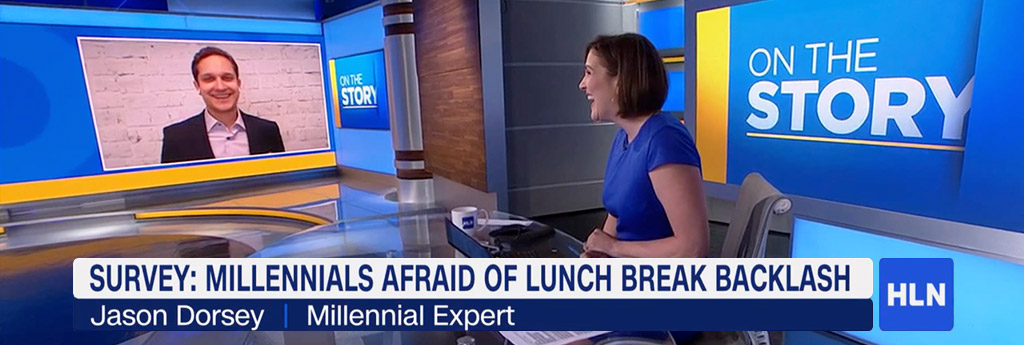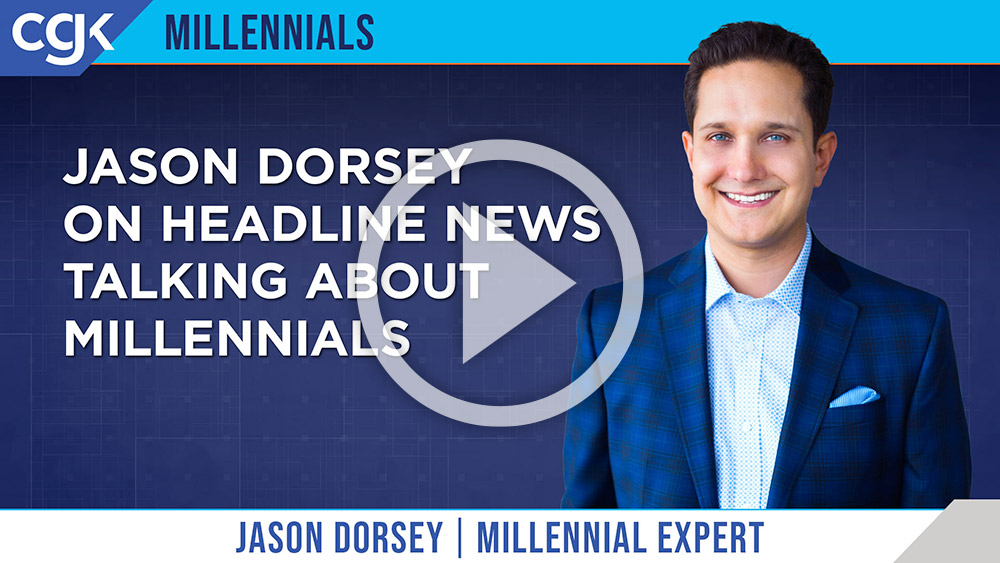
If you put a hidden camera inside a company staffed with today’s multiple-generation mix of Boomers, Gen Xers, Millennials, and Gen Z, you might notice the lunch hour come and go without much fanfare. Desk-based lunch breaks (if you can call them “breaks”) are all too common in the workplace—accepted by some and expected by others. But for Millennials, who want and need that break, there’s a not-so-unspoken rule that taking one is a sign of laziness. Where does that leave the Millennials?
“Unhappy and hungry,” says Jason Dorsey, President of The Center for Generational Kinetics (CGK) and a world-renowned keynote speaker on the Millennial and Gen Z generations. “In a recent study by napkin brand, Tork, 37% of Millennials admitted they don’t feel empowered to take a lunch break.”
Why? Well, for starters, many Millennials are concerned their coworkers will shame them for not being committed enough or not working hard enough. Sadly, their concerns are warranted.
“Lunch break shaming” is real for Millennials
“There’s real shaming going on in the workforce about this,” Dorsey told Lynn Smith of Headline News in a recent live, on-air interview. Watch the interview below:
“Millennials feel intense pressure to perform at work…and they feel if they take a lunch, they’re going to be looked down upon as not committed or not loyal as employees.”
This is particularly ironic, Dorsey says, because the national study also revealed that Boomers were least worried about taking a lunch break and certainly not concerned that a mid-day sustenance break would get them labeled lazy.
“Equally ironic is that, while Millennial lunch-takers are shamed for not pulling their weight, the reality is we need that break to perform at our highest levels,” Dorsey notes. So, while Gen X and Boomer employees may be lunching at their desks—or, at the very least, expecting Millennials to be desk dining—not taking a break actually reduces productivity, which means more work with less energy as a direct byproduct.
The allure and appeal of a lunch break is so real for Millennials, in fact, that the national study by Tork revealed 16% of Millennials would be willing to take a 10% cut in pay to ensure they could take a lunch break every day. That figure is nearly double the percentage of Gen Xers and more than three times the percentage of Boomers who would take the cut to take a lunch.
Encourage lunch breaks to drive employee productivity and retention
In today’s workplace environment, where nap pods and massage rooms are cropping up as a means to attract the next generation of employees, Dorsey says simply making it clear to your Millennial workforce that lunches are not only acceptable but encouraged could be just as appealing a benefit.
“Don’t shame your employees for taking a lunch and expect them to keep working, because now they’re tired, they’re worn out, and they’re maybe even looking for a job somewhere else,” warns Dorsey. “Smart employers are adapting in the ways they can.”
As for the Millennial willingness to take a 10% pay cut to take a lunch? Dorsey says that’s not the way to go. As mentioned, lunchless employees are less productive, less content, and less willing to put up with frustrating yet typical workplace challenges. So, trying to save a buck by taking advantage of this Millennial mindset is likely to cost an employer more in the long run.
“Shaming the Millennials to skip lunch…really comes back on you,” Dorsey told Headline News.
Want more insight into Millennials in the workplace?
Understanding and sharing actual strategies that work with Millennials is one of CGK’s primary objectives. The second is ensuring that this insight makes its way to businesses and leaders so they, too, can understand the personal and professional expectations of the largest generation in today’s workplace.
CGK’s keynote speaking, generational research, and consulting services deliver personalized solutions your organization and leaders can use to unlock the potential of Millennial employees. Our team keynotes events around the world to help clients discover the missing insights into generations and how to shift their businesses, their strategies, and their leadership to respond to each generation’s unique mindset and priorities.
Let us know how we can help you. Send us an email or give us a call and we’ll be happy to provide a little information about our generational speaking or custom research.
For our latest discoveries, follow CGK on Twitter @GenHQ. We are passionate about sharing our latest generational insights!

